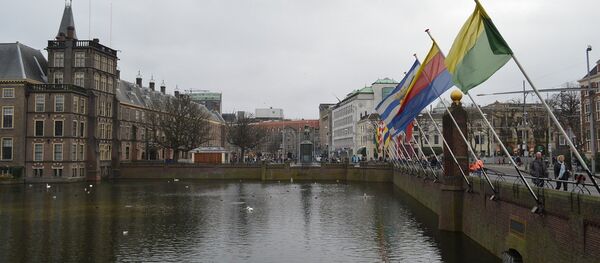It's been a tough year for the European Union. Britain voted to leave with Brexit becoming one of the biggest news stories of the year. Kiev was trying to push for closer ties between Ukraine and the UE, but the ratification of the EU-Ukraine association treaty stalled as 61 of Dutch voters said "No" during a nationwide referendum.
In November of 2016 Donald Trump won the Presidential election in the US, which was considered by many to be a sign of possible reset in relations between Russia and the US, and since the EU often follows Washington's general line, Europe's foreign policy may eventually change its course as well.
Member of the Belgian parliament Aldo Carcaci says that People's Party, which he represents, was the only party in his country to openly support Donald Trump.
Belgian MP for Aldo Carcaci: "Belgians in general, and fruit manufacturers in particular think that sanctions against Russia are unfair." pic.twitter.com/0T9ThrD7in
— Denis Bolotsky (@BolotskySputnik) 28 декабря 2016 г.
Carcasi also says that sanctions against Russia should be abolished for a number of reasons:
Firstly, Belgian entrepreneurs are the main victims of this embargo: they cannot export anything anymore and they suffered economic losses that affected their income in 2015. Of course, they found other ways to export goods – through third countries, which sometimes means that their produce ends up in Russia, or they found other markets. Second thing is that we are the main victims, but for us it's also a big mistake – these sanctions against Russia – because Russia is our ally in fighting against ISIS, against Daesh. Russia and president Putin are our allies, our friends in the fight against Islamism and the Islamic State.
Flemish Interest party, which has ties to US Republicans and is allied with other European patriotic movements, is currently rising in the polls. Sputnik asked the party’s executive, Brussels MP Dominiek Lootens-Stael about sanctions:
I don’t think it's a very good idea to continue those sanctions, because we punish, indeed, our farmers… So I think this problem should be solved in another way, in a diplomatic way, instead of the sanctions.
In 2014 the sanctions caught Belgian farmers by surprise. Some pear growers in the province of Flemish Brabant were ready to harvest and to sell about 30% of their produce to Russia, when the EU imposed sanctions against Moscow, and Russia retaliated by banning European food, including Belgian pears.
Aldo Carcaci says that the country's agriculture and other industries were affected:
Europe's economic sanctions against Russia were prolonged by the EU until July 31st, 2017. They currently affect whole sectors of Russian economy, including energy, banking and defense. EU's diplomatic sanctions were imposed against 152 Russian nationals, whose assets in European banks were frozen and who are banned from entering the Union.
In December of 2016 Russian president Vladimir Putin said that Russia is prepared to cancel its ban of European goods if the EU lifts its sanctions.
We'd love to get your feedback at radio@sputniknews.com.
Have you heard the news? Sign up to our Telegram channel and we'll keep you up to speed!






